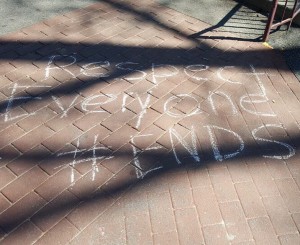I was walking out of a yoga studio and went straight to unlock my bike. I glanced at a short guy with a black eye swollen shut. He made a beeline to me mumbling something like, “Hey, you white, you black.” I say, “Goodbye” firmly several times and ignore him while proceeding to in lock my bike. He doesn’t stop talking and keeps moving toward my bike. I tell him to f*** off and he ends up yanking out my break cable. Three guys across the street yell “Hey! Hey!” and start to cross. Dude with black eye runs off and I jump on my bike and make my escape.
How it made me feel: not super threatened because I was in a street in daylight with people around. It could’ve been worse. But UGH!!
Optional: What’s one way you think we can make public places safer for everyone?
Map instances of harassment and provide descriptions of harassers
– Sarah Hausman
Location: Petworth neighborhood in Washington, DC – Lamont and Kenyon
Share your street harassment story for the blog.
See the book 50 Stories about Stopping Street Harassers for more idea.


 When most people hear the term street harassment, they probably picture of a man whistling at a woman walking down the street, or a man catcalling a woman as he drives by in his car. After all, women make up the majority of street harassment victims and men are most commonly the harassers. According to
When most people hear the term street harassment, they probably picture of a man whistling at a woman walking down the street, or a man catcalling a woman as he drives by in his car. After all, women make up the majority of street harassment victims and men are most commonly the harassers. According to